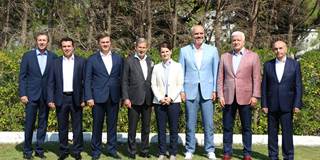A large segment of the Balkan population still hopes for EU membership, despite the problems afflicting the bloc. Although EU leaders cannot guarantee that the accession process will ever be quick and easy, they are the only ones who can ensure that it will still be worth it in the end.
MADRID – Few world regions are more culturally and politically complex than the Balkans. And there may be no clearer illustration of the region’s freighted past and present than the life and legacy of one of its exceptional sons: the physicist and inventor Nikola Tesla.
Born into an Orthodox Serbian family in 1856 in a town that is now part of Croatia, Tesla’s nationality remains an object of debate in the region. Tesla believed that scientific advances should be used to build bridges between countries, and ultimately to achieve universal peace. But there are some in both Croatia and Serbia who want to appropriate his legacy in ways that do not do it justice.
Even Tesla’s contributions to the field of physics have evoked the complicated political dynamics of his native land. In the International System of Units, a tesla is a measurement for the flux density of a magnetic field. And as Federica Mogherini, the High Representative of the European Union for Foreign Affairs and Security Policy, pointed out a few months ago, “The Balkans can easily become one of the chessboards where the big power game can be played.” Indeed, the region has always been situated between competing poles, each projecting power through interwoven economic, political, historical, and cultural links.

MADRID – Few world regions are more culturally and politically complex than the Balkans. And there may be no clearer illustration of the region’s freighted past and present than the life and legacy of one of its exceptional sons: the physicist and inventor Nikola Tesla.
Born into an Orthodox Serbian family in 1856 in a town that is now part of Croatia, Tesla’s nationality remains an object of debate in the region. Tesla believed that scientific advances should be used to build bridges between countries, and ultimately to achieve universal peace. But there are some in both Croatia and Serbia who want to appropriate his legacy in ways that do not do it justice.
Even Tesla’s contributions to the field of physics have evoked the complicated political dynamics of his native land. In the International System of Units, a tesla is a measurement for the flux density of a magnetic field. And as Federica Mogherini, the High Representative of the European Union for Foreign Affairs and Security Policy, pointed out a few months ago, “The Balkans can easily become one of the chessboards where the big power game can be played.” Indeed, the region has always been situated between competing poles, each projecting power through interwoven economic, political, historical, and cultural links.